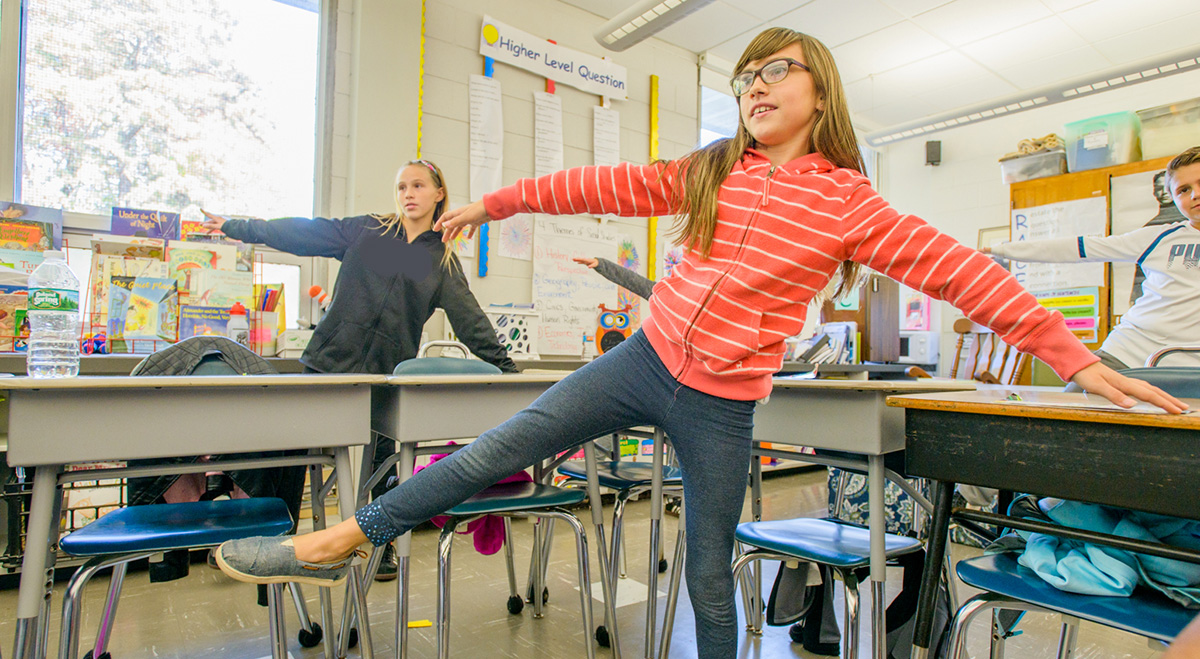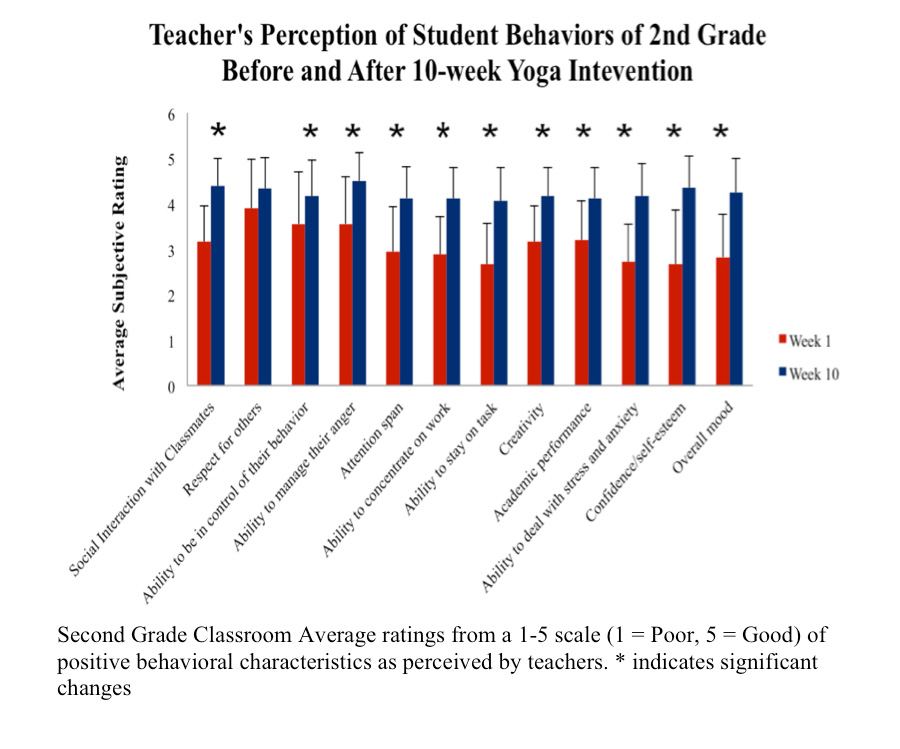
|
Start your Yoga and Mindfulness in the Classroom journey today! Sign Up Now!
|

Thursday, June 06, 2013 (Updated July, 2021)
We are excited to report about the results of our study, Effects of a Classroom-Based Yoga Intervention on Stress & Attention in Second & Third Grade Students which was ultimately published in January 2015 in the Journal of Complementary and Alternative Medicine and the Journal of Evidence-Based Integrative Medicine. Read the abstract and full manuscript here.
The study’s goal was to see if yoga classes in school have an effect on students’ attention span and stress levels – something that teachers reported has improved following a Yoga 4 Classrooms intervention. Rigorous tests were used to get scientific data, such as the salivary cortisol test as the marker of stress level. In addition, teachers were asked to rate each student on a number of academic, social, and emotional outcomes before and after a 10-week yoga intervention.

Statistically significant improvements were observed in both 2nd and 3rd graders in the areas of ability to be in control of behavior, to manage anger, and creativity. As well, according to the teachers, overall improvements in 2nd and 3rd graders were evident in:
Positive significant results also came from the second-grade classroom, showing lower cortisol stress response in students after the 10-week classroom yoga residency, which might suggest that students felt less stressed after learning yoga and mindfulness activities in their school.
As with any study, there are limitations and the need for further tests and analyses. Due to the pilot study design, these results do not allow us to attribute the changes in stress response or other characteristics to the yoga classes specifically. Nevertheless, this study is important as it suggests that long-term practice of mind-body skills positively impacts the stress levels of students, especially at a younger age.
Read more about challenges facing research on yoga on our blog: Why do we need science to prove the effectiveness of yoga-based programs in education?
To learn more on the science of yoga and mindfulness, visit our Supporting Research page.
The poster with the study’s results was presented at the Symposium for Yoga Research (SYR) organized by the International Association of Yoga Therapists on June 11-13, 2013 in Boston, MA. Y4C team is proud to participate in the SYR for the 3rd year in a row. Taking place on June 11-13, 2013 in Boston, MA, this symposium brings together the researchers, practitioners, teachers, students, and policymakers for dialogue and support in the field of yoga therapy. One of the highlights of the conference will be Plenary Presentation: An Overview of Research on Yoga for Youth by Dr. Sat Bir Khalsa of Harvard Medical School. Lisa Flynn and UML researchers attended to present the study poster.
We are excited to have taken the first step to test the effects of yoga programming on a number of student outcomes, and looking forward to the next phase of the research.
For more on the details of the study, visit our Y4C Studies page.
Acknowledgments:
Our sincerest gratitude goes to Dr. Danielle Day and Adam Potts from the University of Massachusetts- Lowell and their research team for conducting the study, as well as Dr. Sat Bir Khalsa and Dr. Bethany Butzer then at Harvard Medical School/ Brigham and Woman’s Hospital, for preparing the scientific publication of the study results.
Many thanks to the students and teachers of the Horace Mitchell Elementary School in Kittery, ME and Principal David Foster for their support and enthusiasm for conducting this study, former Yoga 4 Classrooms Trainer, Sharon Trull, for facilitating the program’s implementation in the school, and Marina Ebert for her assistance with the research project.
This study was funded by a grant from David McGillivray and was supported by the DMSE Children’s Fitness Foundation as well as UMass-Lowell faculty start-up funds. BB and SBSK were supported in part by a grant from the Institute for Extraordinary Living of the Kripalu Center for Yoga and Health. SBSK was also supported in part by a grant from the National Institute on Drug Abuse of the National Institutes of Health (Grant No. 5R34DA032756-02).
| Cookie | Duration | Description |
|---|---|---|
| cookielawinfo-checkbox-analytics | 11 months | This cookie is set by GDPR Cookie Consent plugin. The cookie is used to store the user consent for the cookies in the category "Analytics". |
| cookielawinfo-checkbox-functional | 11 months | The cookie is set by GDPR cookie consent to record the user consent for the cookies in the category "Functional". |
| cookielawinfo-checkbox-necessary | 11 months | This cookie is set by GDPR Cookie Consent plugin. The cookies is used to store the user consent for the cookies in the category "Necessary". |
| cookielawinfo-checkbox-others | 11 months | This cookie is set by GDPR Cookie Consent plugin. The cookie is used to store the user consent for the cookies in the category "Other. |
| cookielawinfo-checkbox-performance | 11 months | This cookie is set by GDPR Cookie Consent plugin. The cookie is used to store the user consent for the cookies in the category "Performance". |
| viewed_cookie_policy | 11 months | The cookie is set by the GDPR Cookie Consent plugin and is used to store whether or not user has consented to the use of cookies. It does not store any personal data. |